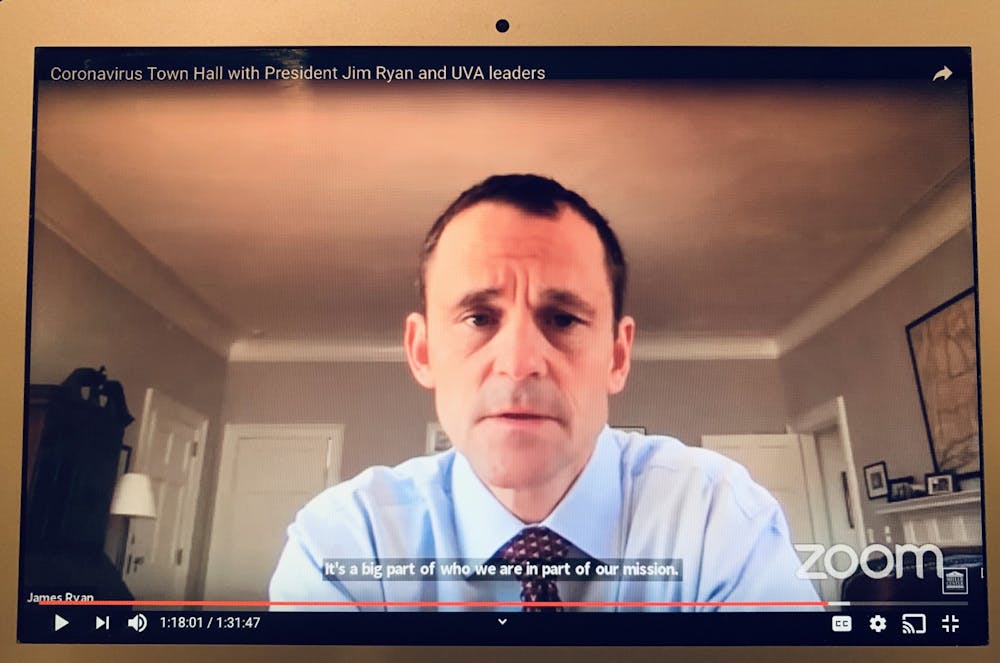University administration hosted a virtual town hall Thursday afternoon to update members of the community and answer questions from a live audience on Zoom regarding the University’s operational changes.
The discussion was led by University President Jim Ryan, Provost Liz Magill, Chief Operating Officer J.J. Davis and Craig Kent, executive vice president for Health Affairs. Up to 1,000 participants were able to register and submit questions during the town hall, which was live streamed by the Miller Center of Public Affairs.
“Our main goal has been to keep our University operating so that we can carry out our core missions of teaching, research — where possible — and medical care, all while doing our best to keep our community healthy, safe and connected,” Ryan said.
Many of the questions asked by audience participants centered around the University’s shift to online classes. Community members wondered if the University has considered lowering the cost of tuition since classes are no longer on Grounds. Although the University has decided not to change tuition — stating that the move to online classes has actually increased the University’s costs — Ryan noted that if fall classes move online, this option will be discussed.
Ryan spoke about the phases in which the COVID-19 pandemic is unfolding from the University’s perspective. The first phase consisted of getting students off Grounds and establishing online classes, and the second focused on moving employees to working remotely and ramping down research. Both of these phases have been completed.
According to Ryan, the University is currently in phase three, which is centered around the health system and ensuring they are prepared to handle future cases of COVID-19. Lastly, phase four focuses on the long-term decisions of the University. Ryan noted that the administration hopes everything is back to normal by the fall, but that it is too early to make that decision.
“I recognize that there is still a great deal of uncertainty which we can’t eliminate because we can’t yet predict with precision how this virus will progress, but we can continue to do our best to make the best decisions we can in as timely a way as we can and communicate them to all of you as plainly as possible,” Ryan said.
Magill addressed updates from the academic division outside of the medical centers. The University currently offers 4,273 courses, all of which have transitioned online, including arts courses, labs and discussions.
The two main risks Magill addressed were the reliance on Zoom and the necessary support of students and faculty. To mitigate these risks, the schools are identifying courses that could move to lectures that students watch at any time and providing the credit/no credit default option for courses this semester.
According to Magill, the Office of Admission is also providing resources for the 8,420 recently admitted undergraduate students, such as live streaming events with faculty and current student panels. They are also working with community colleges and high schools to obtain transcripts.
“Our admissions office is working very hard to think about getting those admitted students the information and experience they need to matriculate,” Magill said. “It’s too early to tell what coronavirus will do to our numbers, but we are watching that very closely.”
On the medical side, Kent spoke to how the University’s medical center has been combating this crisis. Between the University Hospital and their partner Martha Jefferson Hospital, there have been 25 cases. In the Charlotteville community overall, there have been between 50 to 60 cases.
Although the country is anticipated to peak in the second week of April, Kent noted that he believes the peak in Charlottesville will occur in mid-May because Virginia’s outbreak is behind many other states. This will give the community the opportunity to see what methods worked in other areas and be better prepared.
“There are six differents models out there, and every one of them says something different, so nobody really has a crystal ball, but I think over time, based upon the experiences in other places, we are learning more about this disease,” Kent said.
According to Kent, the University has laid the groundwork to be prepared for this crisis. He identified three essential parts of being prepared — having beds, staff and faculty and personal protection equipment.
The University was already planning on adding 86 beds that were scheduled to be completed in June. They were able to move up the project's end date, and 15 of the beds have already been opened, while the rest will be available by May 1. In total, there are 615 other beds available.
At the moment, the medical center has enough staff and personal protective equipment as well. However, about 90 members of the staff have been furloughed due to contracting or being exposed to the coronavirus, and PPE is an ongoing challenge as supply chains are diminishing everyday.
Davis covered operational changes, financial planning and emergency preparedness of the University. The University has complied with the recent executive order in Virginia which requires residents to stay home unless traveling to and from essential work.
According to Davis, Aramark has expanded their employees' benefit coverage including additional sick leave, health benefits, access to telehealth, an employee assistance program and offering five meals per week that employees may pick up for their families beginning next week.
“In all these decisions, sustaining health and safety has been our primary objective, following immediately executing on the University’s core education and healthcare missions,” Davis said.







